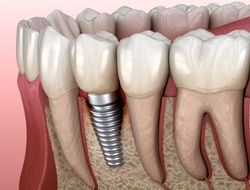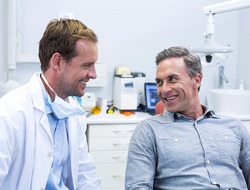Dental Implant Failure & Salvage – Marshall, TX
Preserving Your Restored Smile

Dental implants are among the most successful treatments — for most patients, they are still thriving even 10 years after placement! Of course, it must be acknowledged that a failed dental implant can occur. If you ever feel that something isn’t quite right with any of your new teeth, contact our office right away. Dr. Parker will assess the situation, strive to pinpoint the cause of your problem, and recommend a treatment that, hopefully, will be able to save your restored smile.
Why Do Dental Implants Fail?

The most common cause of failed dental implants is an infection known as peri-implantitis. It occurs when harmful bacteria sneak beneath the gumline and attack the tissue around an implant. Eventually, the damage can become so severe that the jawbone can no longer support the implant. Poor oral hygiene is often to blame for peri-implantitis, but other factors can also contribute to it.
Other reasons a dental implant might fail include:
- Unsuccessful osseointegration (the implant never bonds with the bone around it)
- Medical conditions that affect the body’s ability to support implants
- Physical trauma
Symptoms of Failed Dental Implants

There are two broad categories of dental implant failure. Early failure occurs soon after placement, while late failure can happen at any time, even years or decades after your initial surgery.
Symptoms of early and late failure are similar and can include:
- Severe pain. Some discomfort is normal after your initial placement surgery. However, severe pain, as well as pain that occurs after you have had your implants for a while, are red flags.
- Swelling, pus, or bleeding in the gums. These are all signs of a possible infection and call for immediate professional attention.
- Gum recession. This is often indicative of gum disease or peri-implantitis.
- An implant feels loose. This might be because the restoration needs to be repaired or replaced. However, it could also indicate a problem with one of your dental implants.
- Difficulty chewing. After you adapt to your dental implants, it should be easy for you to eat anything. Uncomfortable chewing often indicates a problem.
How Dental Implant Salvage Works

Seek help as soon as you suspect that something isn’t quite right with your dental implants. The sooner you receive treatment, the more likely it is that we will be able to save your restored smile without using any complex or extensive procedures.
When you get to our office for your appointment, we may take some X-Rays of your mouth and learn about your symptoms. Dr. Parker will carefully evaluate the situation and identify the cause of the problem before he makes a recommendation about your next steps.
In some cases, antibiotic therapy and changes to your oral hygiene routine might be enough to resolve the problem. However, if there is significant damage to the tissue around an implant, it might need to be removed. Then, after some restorative treatments (possibly including a bone graft) and a healing period, it might be possible to place a new dental implant.
 Request A Free Consultation
Request A Free Consultation
